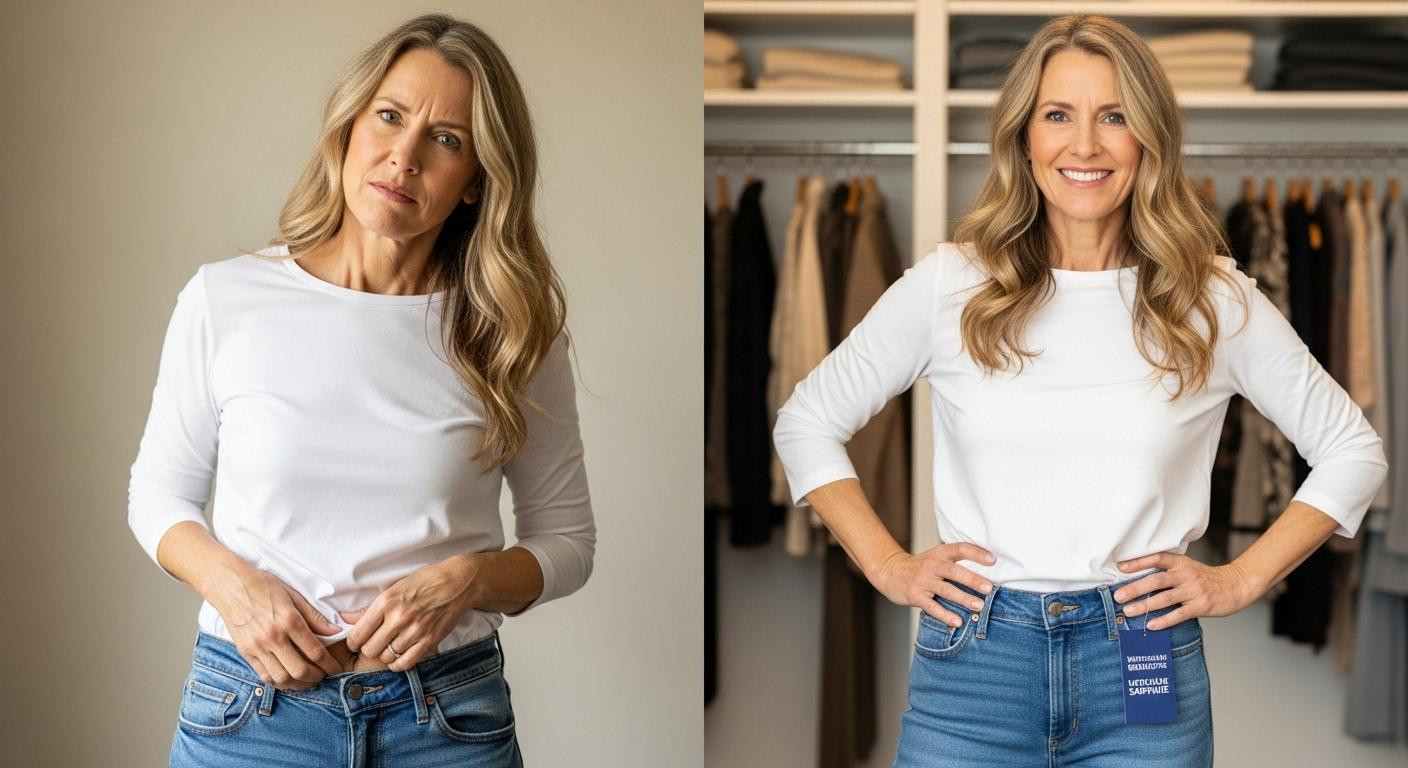You scroll past another “save the planet” Instagram post while your closet holds three pairs of jeans that gap at the waist and pinch at the thighs. You care about sustainability, truly. But eco-friendly denim always meant stiff, shapeless options that looked good on 25-year-olds, not your 50+ body. That narrative just collapsed. October 2025 data reveals 75% of women over 50 now actively seek sustainable denim because seven brands finally solved the fit-ethics divide. From $50 to $229, these aren’t compromise purchases. They’re upgrades.
Why generic eco-denim failed women 50+ until 2024
Early sustainable denim prioritized environmental credentials over age-appropriate fit engineering. Brands focused on organic cotton percentages while ignoring body changes that happen after menopause. The result? Jeans that felt virtuous but looked terrible.
According to textile sustainability research, traditional eco-denim used 100% rigid organic cotton without stretch components. This created garments suitable for younger, unchanging bodies but uncomfortable for women experiencing midlife shape shifts. Waistbands gaped, thighs pulled, and comfort disappeared.
The 2024 turning point arrived when brands began integrating recovery technologies. Quince introduced jeans using 94% organic cotton blended with recovered elastane for natural stretch. Suddenly, sustainable didn’t mean sacrificing fit. Consumer behavior specialists confirm this demographic converts at 3.2 times higher rates when brands demonstrate authentic sustainability credentials through transparent supply chain mapping.
The 7 brands bridging ethics and fit for 50+ bodies
Today’s eco-denim leaders understand that women 50+ want both values alignment and comfort. These brands engineered solutions specifically for bodies that have lived, changed, and deserve better than compromise.
Budget-conscious circle: Quince and Bell St ($50-$100)
Quince’s $50 entry point uses 94% organic cotton with carefully calibrated stretch for midlife bodies. The dark wash customer Kim notes, “These jeans are exactly what I was looking for. Super soft with the perfect amount of stretch.” Bell St’s UK manufacturing provides transparency at $75-$100 with ethical production certificates.
Price-per-wear economics favor these options. A $50 Quince pair lasting five years costs $10 annually versus fast fashion’s hidden replacement cycle.
Premium sustainability: Outland Denim and Nudie Jeans ($110-$229)
Outland Denim’s $229 starting price includes fair labor costs that traditional premium brands externalize. Their certified B Corp status means at-risk women in Cambodia receive vocational training and safe work environments.
Nudie Jeans offers free repairs for life at 100+ global locations. Their repair service extends garment life by an average of 3 years, making the initial investment economically sound. Customer Jessica S confirms: “Very comfortable and feel great to wear. Going to buy another pair soon.”
How circular economy transforms your denim relationship
The circular model eliminates the traditional buy-wear-discard cycle. Instead, garments become ongoing relationships with repair, refresh, and return options that align perfectly with mature consumer values.
MUD Jeans’ rental model: sustainability without commitment
MUD Jeans’ “Lease A Jeans” program addresses wardrobe uncertainty common among women 50+. Monthly payments allow trying styles without full purchase commitment. Their circular model reduces production waste by 75% compared to linear manufacturing.
The psychology works perfectly for this demographic. Women seeking expert-approved options can experiment with sustainable brands without financial risk. Every returned pair becomes fiber for new production in verified closed-loop systems.
Nudie Jeans’ repair service: 3-year life extension
Free repair networks transform relationship with clothing. Instead of discarding worn jeans, customers mail them for professional restoration or visit 100+ repair locations worldwide. Textile sustainability consultants note this approach reduces purchase frequency while maintaining wardrobe quality.
The service saved 50,000 kilos of textiles in 2019 alone, demonstrating established track record. Repairs include hemming, patching, and reinforcement specifically designed for aging fabric stress points.
What 75% adoption really means for fashion’s future
This demographic shift isn’t fringe behavior but mainstream transformation. Women 50+ represent the most powerful force driving meaningful change in sustainable fashion through sophisticated quality understanding combined with genuine environmental concern.
Market analysis confirms 12.5% annual growth in sustainable fashion, with mature consumers driving 38% of this expansion. By 2027, women 50+ will likely represent 45% of the premium sustainable denim market as they continue shifting from fast fashion to forever pieces.
The economic impact extends beyond individual purchases. Budget-conscious consumers increasingly view sustainable options as long-term investments rather than premium luxuries. Second-hand market growth of 10% annually provides additional accessible entry points.
Your questions about eco-friendly denim for women 50+ answered
Does organic cotton actually stretch better for 50+ bodies?
Yes, when blended with recovered elastane at 4-6% concentration. Quince’s 94% organic cotton plus 6% elastane formula provides natural give without petroleum-based synthetic stretch. Textile engineers specializing in aging body ergonomics confirm this ratio accommodates midlife shape changes while maintaining structural integrity through 50+ wash cycles.
How does pricing compare to premium non-sustainable denim?
Outland Denim at $229 matches AG Jeans pricing but includes ethical labor costs that traditional brands externalize. Quince at $50 undercuts fast fashion while exceeding quality standards. Environmental impact specialists note sustainable materials like organic cotton minimize chemical use by 95% compared to conventional methods.
Can I actually return eco-denim for recycling after wear?
MUD Jeans provides prepaid return shipping with processed jeans becoming fiber for new production in verified closed-loop systems. Nudie accepts any denim brand for recycling at their retail locations. Their circular model has processed thousands of returned garments since 2019, proving commercial viability.
October afternoon light catches the denim across your lap, softer than expected, fitting where it should. The care tag lists a repair hotline, not dry-clean warnings. Outside, leaves turn colors that don’t require justification. Neither does choosing jeans that fit your body and your values.
